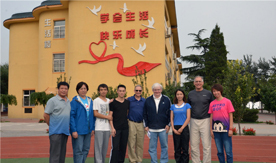
Butterfield Shares Expertise
In September, University of Maine Professor Stephen Butterfield helped train students at China’s Beijing Sport University (BSU) how to test motor proficiency of children with intellectual disabilities.
Despite being 6,500 miles from Orono, Maine, Butterfield says the experience was much like being in an American classroom; the 30 undergraduate, graduate and doctoral students he taught each had an American name (as well as a Chinese name), spoke some English and wore Western-style clothing.
The BSU students are taking part in the Chinese government-funded study to develop a national database, says Butterfield, professor and chair of UMaine’s Department of Exercise Science and STEM Education. The data they gather about motor proficiency of youth with intellectual disabilities will likely be used to generate policy and provide direction for instruction and research, he says.
“I was honored to be invited to participate in this project,” Butterfield says. “It’s a pretty big study and will reach all parts of China. Eventually this project should result in Chinese children with disabilities receiving better physical education and opportunities to participate in sports. Data can speak very powerfully. Dr. Glenn Roswal, a world leader in APE (Adapted Physical Education), contacted me about a year ago. In terms of travel, the timing wasn’t great — second week of classes — but Dean (Dee) Nichols was very supportive.”
Butterfield conducted the training with Roswal from Jacksonville State University in Alabama and Mike Loovis of Cleveland State University in Ohio.
BSU has more than 14,000 students who study various fields within exercise science and sports, including coaching, sport science, management, journalism and rehabilitation. Butterfield says its facilities are impressive; the 1,400-acre campus has 25 gymnasiums and 62 outdoor sport fields. In the previous four Olympics, BSU staff and students have won 30 gold medals, 16 silver medals and nine bronze medals, according to the school’s website.
Butterfield says the students he trained were professional, smart, attentive, inquisitive and respectful of the youth with whom they worked. While a return trip to China is possible, Butterfield says additional consulting will likely be done electronically.
The weeklong all-expense-paid trip, Butterfield’s first to China, was gratifying. He visited Tiananmen Square and the Great Wall of China, dined at a country club adjacent to a golf course and was asked by a number of Chinese citizens to pose for pictures. Youth gave him artwork.
“The Chinese were wonderful hosts,” Butterfield says. “The subway system was clean and efficient and the traffic was unbelievable — it flows like a river. The air quality was variable and a lot of people wore masks.”
While Butterfield is widely recognized as a leader in adapted physical education, the specialty wasn’t part of his early career plan. In the early 1970s, after completing his bachelor’s at Springfield College focusing on curriculum and instruction in physical education, he was offered a job teaching physical education and coaching boys basketball at Austine School for the Deaf in Brattleboro, Vt.
“I wasn’t really interested at first, but my wife was expecting and I had no job so I took it,” he says.
Butterfield learned sign language and found the job to be tremendously gratifying. “No one appreciates you more than kids with disabilities and their parents,” he says. “It’s a pretty big reward.”
When youth with multiple disabilities began attending the school, Butterfield decided he needed additional training to remain an effective educator. When he returned to school — The Ohio State University — he earned his Ph.D. with a focus on adapted physical education.
At UMaine, one of Butterfield’s courses is Adapted Physical Education, a required class for kinesiology and physical education majors in which students are paired with children and adults with disabilities. Butterfield has been teaching the course for nearly three decades.
Contact: Beth Staples, 207.581.3777
